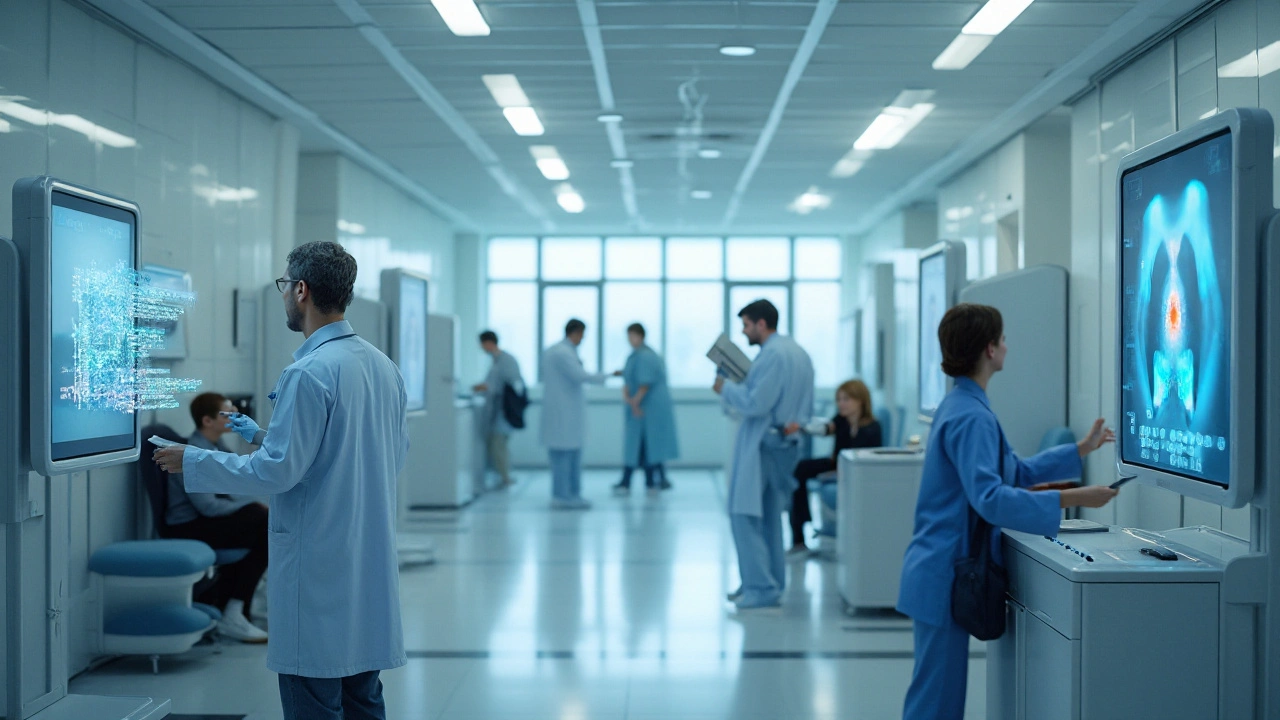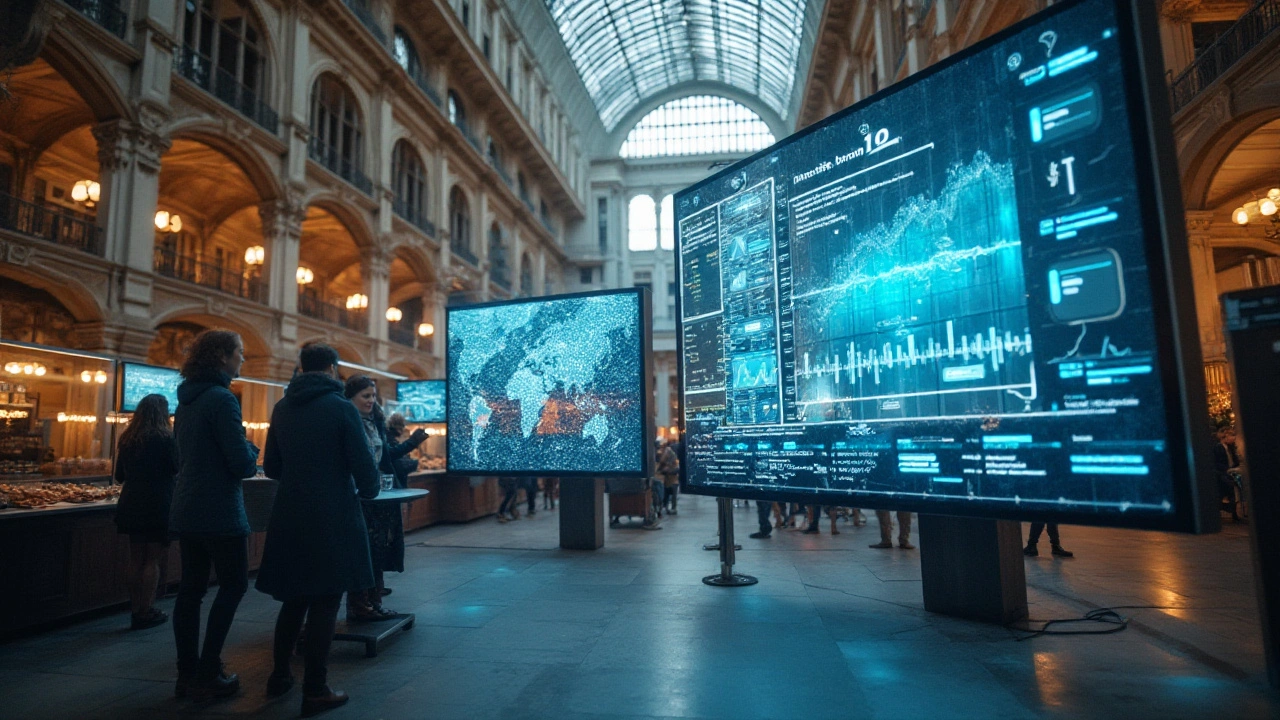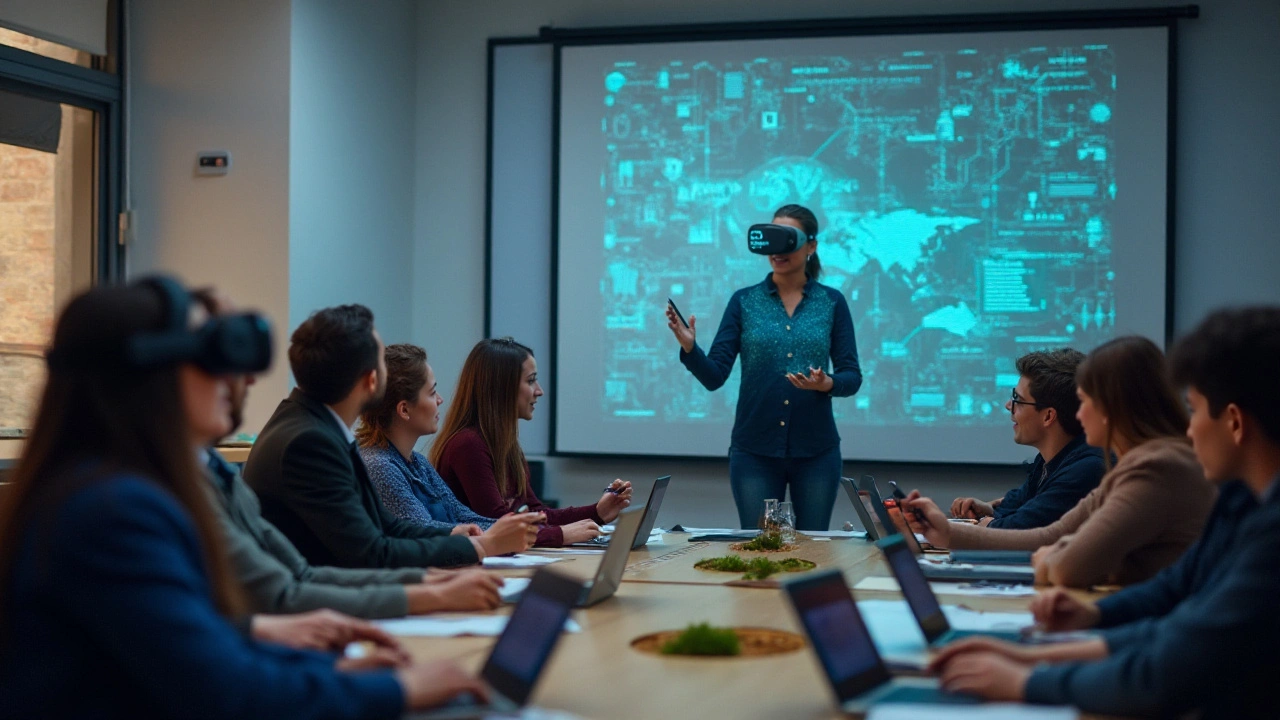Harnessing the Potential of Artificial Intelligence in Modern Society

Artificial intelligence, often abbreviated as AI, isn’t just a futuristic concept anymore. It's here, changing the way we live and work. From voice assistants like Siri and Alexa to more complex systems that drive cars and diagnose diseases, AI is becoming a crucial part of our daily lives.
But what exactly is AI? At its core, artificial intelligence involves creating machines that can mimic human intelligence. This includes learning from experience, understanding complex concepts, recognizing patterns, and making decisions based on data. It's like giving our computers and devices a brain.
Introduction to AI
Artificial Intelligence, or AI, has been a concept floating around since the mid-20th century. It gained significant traction in the mid-1950s when computer scientists began to explore whether computers could be programmed to exhibit intelligent behavior. Early pioneers like Alan Turing, who developed the Turing Test, laid the foundational questions about machine intelligence. Today, AI has become a household term, thanks to its infiltration into various industries and consumer applications.
At its essence, AI seeks to create systems that can perform tasks typically requiring human intelligence. This includes activities like learning from data, recognizing speech, understanding natural language, and even playing games. AI systems are built using algorithms and vast amounts of data, which helps them 'learn' and improve over time. This process is akin to how humans learn from experience, but the difference lies in the scale and speed at which AI can process information.
One compelling example of AI's capabilities is in healthcare. AI algorithms can analyze medical images to detect diseases like cancer at an early stage, often with higher accuracy than human doctors. In finance, AI systems are used for fraud detection by analyzing transaction patterns that would be impossible for a human to notice. These applications showcase the transformative power of AI across different fields.
There are various types of AI, ranging from narrow AI, which is designed for specific tasks, to general AI that can theoretically perform any intellectual task that a human can do. Narrow AI includes things like recommendation algorithms used by Netflix and Spotify. On the other hand, general AI still remains a concept more explored in science fiction than in real life. Researchers are working tirelessly to reach this next level, but ethical concerns and technical challenges make it a complex pursuit.
Elon Musk once said, "AI is a fundamental risk to the existence of human civilization," emphasizing the need to proceed with caution. This stark warning encapsulates the double-edged nature of this powerful technology. While it's exciting to think about the convenience and advancements AI brings, it’s equally important to consider its ethical implications and potential risks.
Methodologies like machine learning and deep learning are subfields of AI. Machine learning allows systems to learn and adapt without explicit programming. It uses algorithms that improve through experience. Deep learning, a subset of machine learning, uses neural networks with many layers (hence the term 'deep') to analyze various factors of a dataset. These approaches have led to significant breakthroughs in image and speech recognition, language processing, and even autonomous driving.
In summary, AI is about making machines smarter in a human-like way. It's an exciting field with endless possibilities and significant transformative potential. Whether it's enhancing daily conveniences like smart home systems or revolutionizing entire industries like healthcare and finance, AI is here to stay and evolve. Navigating the world of AI requires an understanding of its basics, potential, and the careful balance between innovation and ethical responsibility.
Benefits of AI
Artificial Intelligence has rapidly become one of the most transformative and influential technologies. Its impact spans across various sectors, bringing notable developments and efficiencies. One of the most remarkable benefits of AI is its ability to analyze massive amounts of data swiftly. Traditional systems would take days, if not weeks, to process certain datasets, but AI can do it in a fraction of the time. This has profound implications for industries like healthcare, where early detection of diseases through data analysis can significantly improve patient outcomes.
In the realm of finance, AI algorithms aid in fraud detection, which saves companies millions in potential losses. By recognizing unusual patterns and anomalies in transactions, these systems can alert human analysts to possible fraudulent activities. This sort of precision and speed was unattainable just a few years ago.
Moreover, AI's role in enhancing customer experiences is worth mentioning. Virtual assistants and chatbots provide instant, 24/7 customer support, answering common queries and resolving issues without human intervention. These AI-driven tools improve user satisfaction by reducing wait times and providing consistent assistance.
Another significant advantage is the automation of repetitive tasks, which frees up human workers to engage in more strategic, creative, and complex problem-solving. This sort of automation does not just increase productivity but also enhances job satisfaction by removing monotonous tasks from daily workflows. According to a report by McKinsey, AI-driven automation could boost productivity by up to 40% in some sectors, leading to substantial economic growth.
"AI will shape our future by making lives more comfortable and businesses more efficient," says Sundar Pichai, CEO of Alphabet Inc.
In the context of environmental sustainability, AI helps in optimizing energy use, reducing waste, and promoting green technologies. For instance, smart grids and AI-based energy management systems enable better distribution of electricity and reduce energy loss, ultimately leading to more sustainable practices. In agriculture, AI can predict weather patterns, monitor soil health, and even suggest the best times for planting and harvesting, thereby increasing yields and conserving resources.
Lastly, AI is a powerful tool in education, tailoring learning experiences to individual needs. Adaptive learning platforms adjust to the pace and style of each student, offering personalized resources and feedback. This individualized approach improves learning outcomes and ensures that no student is left behind.

Practical Applications
Artificial Intelligence is making its mark in just about every sector imaginable, transforming how we go about our daily lives and work routines. One notable area is healthcare. AI systems can analyze billions of data points to help in diagnostics. For example, AI algorithms can read and interpret medical images like x-rays and MRIs in a fraction of the time it takes a human doctor. This quick analysis leads to faster diagnosis and treatment. Even personalized medicine, where treatments are customized to fit individual patients, benefits from AI.
Another field where AI is endlessly useful is finance. AI-driven algorithms predict stock market trends by analyzing historical data. Automated trading systems execute buy or sell orders at the optimal time. Fraud detection systems flag suspicious activities by recognizing patterns and anomalies faster than traditional software. It's like having a financial advisor who's available 24/7.
Retail and e-commerce are also being revolutionized by AI. Have you ever wondered how Amazon suggests items that are uncannily suited to your tastes? That’s AI at work, recommending products based on your shopping habits. Predictive analytics help retailers manage inventory, reducing waste and ensuring you rarely see an “out of stock” message. Chatbots handle customer service inquiries, reducing the need for human customer service agents.
Transportation is another field where AI has emerged as a game-changer. Self-driving cars, while not yet mainstream, are making significant strides. These vehicles use AI to navigate, interpret traffic signals, and even predict and avoid collisions. AI-powered logistics systems optimize routes for delivery trucks, saving time and reducing fuel consumption.
Education, too, is seeing the benefits of AI. Personalized learning platforms adapt to individual students' needs, making education more tailored and effective. AI tutors provide round-the-clock assistance, helping students understand tough concepts. Automated grading systems offer instant feedback, allowing teachers to focus more on instruction rather than administrative tasks.
Entertainment isn't left behind. AI algorithms recommend music, movies, and even books based on your preferences. These systems analyze what you’ve interacted with previously to suggest new content that you'll likely enjoy. Video game developers are also using AI to create more immersive and responsive game worlds.
“Artificial Intelligence is not just another technology, it's a revolution,” says John McCarthy, one of the pioneers in AI.
Even agriculture is harnessing the power of artificial intelligence. Farmers use AI-driven equipment for tasks like planting, harvesting, and irrigation. Drones equipped with AI analyze crop health and detect issues like pests or drought conditions early on. This leads to better yields and reduced waste.
Finally, consider the impact of AI on everyday life. Personal assistants like Siri and Alexa, which help manage schedules, play music, and answer questions, rely on artificial intelligence. Home automation systems that control lights, security cameras, and thermostats also use AI to learn your preferences and automate tasks. These applications show that AI is not just science fiction; it's a vital part of our present and future.
Ethical Considerations
As artificial intelligence becomes more integrated into our lives, we can't ignore the ethical questions it brings up. One major concern is the potential for bias. AI systems learn from data, and if the data they learn from contains biases, then the AI can perpetuate and even amplify these biases. This has real-world consequences, such as AI in hiring systems unfairly filtering out certain groups of people.
An example of AI bias is in facial recognition technology. Studies have shown that these systems often have higher error rates for people with darker skin tones. This raises critical questions about fairness and equality in technology. A study by MIT Media Lab found that commercial facial recognition systems had error rates of up to 34.7% for dark-skinned women compared to just 0.8% for light-skinned men.
Privacy is another big concern when it comes to AI. As these systems gather and analyze data, it's essential to think about who has access to this information and how it's being used. Can we trust companies and governments to handle our data responsibly? The Cambridge Analytica scandal highlighted how data could be misused, reminding us of the importance of robust data protection measures.
Job displacement due to AI automation is also a critical issue. While AI can create new opportunities, it can also lead to job losses in certain sectors. For instance, self-driving trucks could eventually replace truck drivers. However, new roles in AI development, maintenance, and oversight are emerging. It's crucial to balance the benefits of automation with support for those whose jobs are affected.
"Artificial intelligence is no match for natural stupidity," said Albert Einstein, emphasizing the need for critical thinking in developing AI systems.
The concept of AI ethics also extends to decision-making processes. How do we ensure that AI makes fair and just decisions? In the medical field, AI systems like IBM's Watson are being used to diagnose illnesses and suggest treatments. While this can improve efficiency and accuracy, the stakes are high. Incorrect decisions can have serious consequences, so clear guidelines and oversight are essential.
Transparency is another vital aspect of AI ethics. It's important for companies to be open about how their AI systems work. This helps build trust and allows for independent verification. If an AI system is being used to approve loans, for example, the criteria it uses should be clear to ensure fairness.
Lastly, we need to consider the long-term impact of AI on society. The development of superintelligent AI, while still theoretical, raises questions about control and safety. How do we ensure that future AI systems align with human values and do not pose risks to humanity?
Addressing these ethical considerations requires a multi-faceted approach. Policymakers, tech developers, and society as a whole need to work together. Developing guidelines and regulations is crucial, as is promoting ethical AI development practices. The key is to balance innovation with responsibility, ensuring that AI serves the greater good.

Future Directions
AI's potential continues to expand, giving us a glimpse into a world where our lives could be transformed dramatically. One of the most promising areas is healthcare. Imagine systems that can predict illnesses before symptoms even appear, or robots assisting in surgeries with pinpoint precision. Such applications aren’t distant dreams; they are being developed as we speak. According to a report by PwC, AI could contribute an additional $15.7 trillion to the global economy by 2030.
Transportation is another sector poised for disruption. Autonomous vehicles are already being tested on the roads. Companies like Tesla and Waymo are leading the charge, promising a future where our cars drive us. This could reduce accidents caused by human error, potentially saving thousands of lives annually. Public transportation may also see improvements with AI optimising routes and schedules for efficiency.
"AI is going to change the world more than anything in the history of mankind. More than electricity." – AI researcher Dr. Kai-Fu Lee
In the realm of entertainment, AI is setting new standards. Streaming services like Netflix and Spotify use AI to recommend content tailored to individual preferences. But, how about AI-generated content? We're already seeing algorithms write music, create visual art, and even produce movie scripts. This raises fascinating questions about creativity and the human role in art.
Education is on the brink of transformation too. AI-powered tutoring systems can provide personalised learning experiences, adjusting to the needs of each student. Schools and universities might integrate AI into their curriculums, preparing the next generation for a tech-driven world. The challenge here will be ensuring equal access to this technology to avoid widening the educational gap.
Ethical Implications
As we look towards this future, ethical considerations must be addressed. Questions about data privacy, job displacement, and decision-making transparency come into play. Ensuring AI is developed responsibly will be critical. For instance, algorithms should be designed to avoid biases that could lead to unfair outcomes in criminal justice or hiring practices.
| Sector | Potential Impact |
|---|---|
| Healthcare | Predictive diagnoses, robotic surgeries |
| Transportation | Autonomous vehicles, optimised public transport |
| Entertainment | Personalised recommendations, AI-generated content |
| Education | Personalised learning, AI-integrated curriculums |
The power of artificial intelligence is clear, but with great power comes great responsibility. As we journey into this AI-driven future, striking a balance between innovation and ethical considerations will be our biggest challenge. With mindful development, the prospects of AI can lead to a brighter, more efficient world.